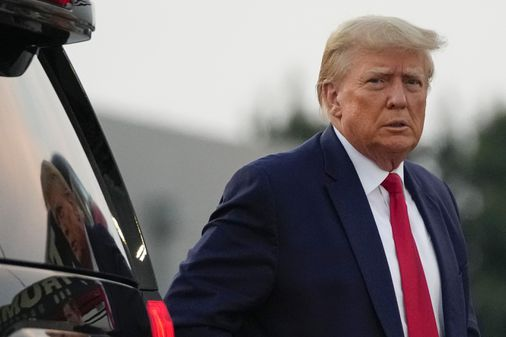“I will be asking the attorney general’s office for their input,” Secretary of State David Scanlan told the Globe. “And ultimately whatever is decided is probably going to require some judicial input.”
A debate among constitutional scholars over former president Donald Trump’s eligibility for the 2024 presidential race has reverberated through the public consciousness in recent weeks and reached the ears of New Hampshire’s top election official.
Secretary of State David Scanlan, who will oversee the first-in-the-nation presidential primary in just five months, said he’s received several letters lately that urge him to take action based on a legal theory that claims the Constitution empowers him to block Trump from the ballot.
Scanlan, a Republican, said he’s listening and will seek legal advice to ensure that his team thoroughly understands the arguments at play.



Not until proven guilty, legally speaking, surely?
The language specifically does not require any conviction. A conviction would make 14A S3 undeniably apply, but a lack of conviction doesn’t make it not apply.
You kinda just said that it can be denied that it applies without a conviction. I think it’s tenuous at best, but I’m not a lawyer. I just know that, typically, you can’t say someone did a thing if it hasn’t been legally proven.
If the amendment had required a conviction of some kind, that requirement would have been stated. It is not.
Sure you can. Trump is a rapist. He raped e jean Carrol with his fingers. Wasn’t convicted but facts are facts.
The Jan 6th commission is enough to show he participated in an insurrection.
This is a really weird rule. So we are going to have 50 separate decisions each one, at least on paper, independent of each other?
Elections for president, senators, and representatives are run solely by the states. It’s why we have multiple different “kinds” of federal elections. The election process depends on what state you’re in, and how the state legislature has determined to organize that election. Most states - but not all - are “winner take all” for electoral college votes. Maine and Nebraska split those votes based on proportion of popular vote.
So, because states are the only place where federal elections are operated, each state would need to adjudicate who is eligible to be on the ballot for a given office. Coincidentally, this is exactly why Mark Meadows’ claim that he was performing the duties of his office as White House Chief of Staff when participating in the pressuring of Brad Raffensperger to change the outcome of the Georgia presidential election fails. Nobody in the federal government has any business being involved in elections operated by a state. Doing so is, by definition, not part of the duties of any federal position.
Yes, fifty separate decisions, in theory. However, the moment one state (especially one where Trump has any chance of winning the popular vote therein, so not California, for example) decides to disqualify Trump from being on the ballot for president, there will be a legal challenge to that action. And because the rule here is one enshrined in the US Constitution, the case would likely be very quickly passed up to or appealed to federal court, possibly SCOTUS.
But federal courts may decline to hear the case, since, as above, states decide how to run elections. And if a state has determined that someone is ineligible to be on the ballot, … nobody in the federal government has any business there.
New Mexico has already made moves to remove someone at state level from the ballot for being in the Capitol on Jan 6. That case didn’t go all the way through, the election happened and the guy lost, so it was moot. But they did get as far as positively defining Jan 6 as an “insurrection,” and seemed ready to follow through with disqualification.
In practice, only a handful of swing (or red, somehow) states would need to disqualify Trump to prevent him from being elected. If you fall short of 270 electoral college votes, you lose. You don’t have to disqualify all states, just enough to make 270 electoral votes a statistical impossibility.
Thanks for the well written post
That is what the 50 states are for. If not then why not just get rid of them and relieve the expense of your middle layer of government?
I just think it is a weird freaken rule I also am surprised it hasn’t been abused the hell out of especially given that nearly every president we have ever had was in government prior for years before office.
Don’t get me wrong I don’t think he should be able to run again I just didn’t know that a state official could just decide that. I thought it had this long long process.
It doesn’t say “convicted of…”.
I doubt they put every Confederate on trial. Still I imagine there must be some court ruling for this to be the case. IANAL but a state court may make this decision and bar him from running in their state.